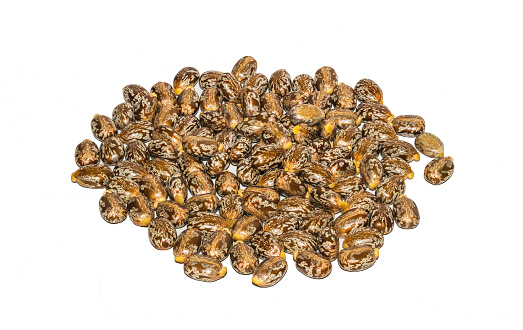
CASTOR BEAN OIL
The fascinating process of oil extraction
Ricinus oil can be extracted from the hulled seeds of Ricinus communis L., which have an oil content of around 40 – 50%, by means of mechanical pressing using the cold pressing process. However, this extracted oil should then be refined to prevent the toxic ricin from entering the oil.
Hot & cold pressing process
Although the quality of cold-pressed ricinus oil is better, it is also possible to hot-press the hulled ricinus seeds, which has the advantage of producing a higher yield. For this, the seeds are heated before pressing and added to a screw press. This produces lees oil and ricinus press cake. However, the press cake contains approx. 10% oil after pressing, which is why extraction with hexane, heptane or a hexane-heptane mixture can be carried out to obtain an even larger quantity of oil. Once the solvents have also been removed from the extraction residue, only around 1% oil is left in the ricinus meal.
Both production methods are followed by refining of the extracted oil. Refining consists of degumming, deacidification and subsequent steam treatment of the oil. As a result, the toxic ricin remains in the press cake and is no longer contained in the oil, which is why it can now be used for therapeutic purposes.
If the protein residues are to be removed from the oil, degumming is carried out, which consists of adding 3-5% water, heating to 70-80°C and then separating the water again by centrifugation.
In contrast to many other press cakes that are produced during oil extraction from the seeds and kernels of various plants, untreated ricinus press cake cannot be used for animal feed production despite its high protein content.
Ricinus oil is characterized by its diverse properties
Castor oil has a clear, almost colorless to yellowish color and forms a flammable and thick, viscous liquid.The faint but characteristic odor of this oil is reminiscent of damp paper and smells slightly herbaceous and woody.Although it is almost tasteless, it still has a characteristic, somewhat unpleasant taste.Other properties of ricinus oil are that it belongs to the group of non-drying oils, as it thickens in the air but does not harden into thin films, and has a high polarity due to its high proportion of hydroxy fatty acids and is therefore highly soluble in ethanol, but difficult to mix with aliphatic hydrocarbons and insoluble in fats.
Shelf life of castor oil
The shelf life of castor oil is normally 6 to 8 months.
Discover the versatile application possibilities of castor oil
Ricinus In pharmacy and medicine
The book “Öle- natürlich kaltgepesst” by Marcus Hartmann and the book “Lexikon der pflanzlichen Fette und Öle” show that (refined) castor oil is used for a variety of purposes in pharmacy and medicine.
On the one hand, it serves as a successful laxative in cases of constipation or for accelerated bowel evacuation and on the other hand, due to its comparatively high polarity, as a good solvent for many medicinal substances. Furthermore, ricinus oil can be used as an additive for eye drops due to its high viscosity and low provision of a breeding ground for microorganisms. This oil is also frequently used for injection purposes to administer lipophilic drugs that cannot be administered orally. In particular, sex hormones with a depot effect are used in the form of oily solutions (ampoules for i.m. application). Finally, castor oil is also used topically. A positive property of ricinus oil is its very good penetration capacity into the intercellular spaces of the cornea. For this reason, this oil can be used topically to treat dandruff, scarring, age spots and hemorrhoids. It is also used as an emollient in the field of dermatology.
Ricinus oil in folk medicine
In naturopathy, ricinus oil is used to relieve breast inflammation, to loosen stiffened arthritic joints, to increase the function of congested lymph glands and to strengthen the immune system. This oil is also said to be able to alleviate herpes diseases and relieve spasms and congestion in the abdomen. Hot ricinus oil applications are also said to have a positive effect on colitis and ulcer formation and stimulate the digestive system.
Castor oil is a true all-rounder in cosmetics!
Due to its high viscosity and good solubility in ethanol, castor oil is frequently used in cosmetic products. For example, it is often found in hair products, hair care products and mascara and can also be found in bath oils with emulsifiers for dry skin. In addition, this oil can penetrate well into intercellular spaces, e.g. calluses, and is therefore often used to treat dandruff, scars, age spots and hemorrhoids. It can also help heal cracks and fissures as it forms a mechanical protective film against water and water-soluble pollutants. Ricinus oil is also used as a raw material for the production of lipsticks, cosmetics and shampoos, whereby the triricinolein contained in the oil is particularly important due to its moisturizing and softening effect on skin and hair.
Ricinus in technology? Yes, you read that right!
Ricinus oil can be used in many different ways in the field of technology. It is a sustainable alternative to conventional diesel and helps to reduce greenhouse gas emissions. But that’s not all! Ricinus oil is also used in the production of soaps, paints, dyes, inks, waxes, polishes and cold-resistant plastics. This oil is the only vegetable oil that is available in large quantities and naturally has the necessary OH functionality to react with di- or polyisocyanates to form polyurethane polymers. These are then used for PU foams (e.g. upholstery, mattresses, construction foams), casting resins and adhesives. Ricinus oil is also a good binder for varnishes and paints, varnish, linoleum and printing inks.
We will be happy to advise you on this seed and show you options. Contact us
In addition to their own knowledge acquired through press trials, the following sources were used to create the article:
- Öle, natürlich kaltgepresst, Basiswissen & Rezepte, Marcus Hartmann, Hädecke, 2008
- Heilende Öle, Pflanzenöle als Nahrungs- und Heilmittel, Neue Erkenntnisse, Günter Albert Ulmer Verlag Tuningen
- Lexikon der pflanzlichen Fette und Öle, Krist, Buchbauer, Klausberger, SpringerWienNewYork, 2008
- www.wikipedia.de
- en.wikipedia.org


